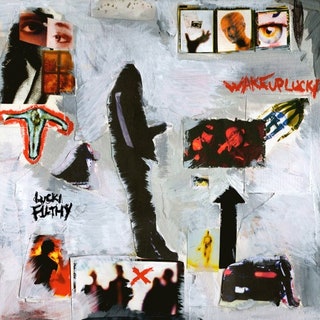Over synth-heavy beats by the co-founder of Philadelphia's Working on Dying collective, the Chicago rapper writes intensely diaristic songs delivered with numb detachment.
Over the last decade, Chicago rap has been characterized by two predominant strands in the popular imagination: drill, with its hard edges and bleeding heart, and the candy-colored stylings of more backpacker-friendly artists like Chance the Rapper, Vic Mensa, and Mick Jenkins. If Keef and Durk are like the Thug and Gucci of Chicago, the scene revolving around Chance resembles more the “New Atlanta” of iLoveMakonnen, Awful Records, and Earthgang. But Lucki, who received one of his first major co-signs from Chance in 2014, has taken neither of those routes; he’s closer in spirit to Playboi Carti, a singular artist who has paved a lane of his own. Fittingly, one of Lucki’s chief beatmakers, and the sole producer of his new album WAKE UP LUCKI, is F1LTHY, founder of Philadelphia production collective Working on Dying and the sonic accelerationist behind many of the brain-melting beats of Carti’s Whole Lotta Red.
While both Lucki and Working on Dying straddle the line between mainstream rap and the most abrasive edges of SoundCloud, on WAKE UP LUCKY, they maintain a measured distance from the limelight. Lucki’s partnership with a certified hitmaker yields a diaristic sketchbook that feels almost invasive to view; his inward focus recalls the seasonal depression of Bladee, one of the first acts F1LTHY produced for, more than anything from his Chicago peers.
Lucki’s sadness and Working on Dying’s futuristic, synth-focused beats have their clear progenitors. Raider Klan and SpaceGhostPurrp are to 2010s rap what the Velvet Underground were to underground rock: To adapt the old adage, it seems that everyone who downloaded a zip file of Blvcklvnd Rvdix 66.6 in 2011 got themselves a cracked copy of Fruity Loops and started making beats. But while so many artists latched onto Raider Klan’s hauntology—the ghostly horrorcore samples, lo-fi recording styles, and ’90s nostalgia—Working on Dying gravitated toward the psychedelic haze, that feeling of taking a tab of acid late at night when you’ve already been awake watching television for 36 hours. There are shades of electronic music in their sound, which sometimes recalls Drain Gang or the beats AraabMuzik was making in his Dipset Trance Party era, but it’s more like hearing a rave through drywall while you slip into a coma than being in the middle of the throng. Working on Dying’s production also frequently recalls another kind of underground music popular on SoundCloud in the 2010s: the endless deluge of Nintendo novelty remixes that layered Danny Brown or Death Grips over the Wii Shop Channel music or Legend of Zelda soundtrack cuts—adorable and even cutesy sounds juxtaposed against jagged and emotional bars.
F1LTHY’s distinctive tread bass sound is dependably thick and pounding across WAKE UP LUCKI, but the synths on top are unpredictably kaleidoscopic: “BUSY DAY” brings in crystalline bells, while “OUTRO” sounds like an off-kilter church organ. Individual synthesizer notes bleed and blur together into a continuous stream of off-kilter sound, like on “WHERE I BE,” where the higher pitches of a keyboard turn eerie and flute-like. In the background of “SPARKS VISION,” pitch-shifted vocal flips turn the human tongue into ribbons of tone, the most EDM-like touch on the album.
While Chance’s early brand of hallucinogenic gospel eventually calcified into wife-guy music that sounds profoundly out of touch with the current moment, Lucki’s own emergent style, which the title of his first mixtape dubbed “alternative trap,” has remained fluid and evolving, imbuing his psychedelic worldview with shades of darkness. Despite F1LTHY’s clout and the similarities Lucki might share on the surface with Carti or Uzi, WAKE UP LUCKI strikes a hermetic tone, a party for two without a feature to be found. Lucki’s career has been marked by addiction, missed opportunities, and isolation, which you can resoundly feel in his flow: While the beats might be brightly shaded, Lucki himself frequently sounds dejected and distressed, with a mind numbed to pain and half-fried thoughts that trail off. His voice is a steady waveform, with dry and raspy intonation that remains at a consistent volume, expressing his affective detachment. When Lucki talks about drugs, he sometimes describes bliss and euphoria, but just as often there are bad trips and bad vibes, hangovers and depressive hazes and dry mouth. While substances are frequently an escape, Lucki also readily admits that they’re inseparable from and woven into his other issues, and a contributing factor to the decline of interpersonal relationships.
There’s no room for cleverness or intense wordplay in Lucki’s blurred reality; it’s the peeled-back frankness of Lucki’s bars that makes them so wounding, like the unadorned confession of “CRYOUT”: “She let me cheat if I’m in it to win/Talkin’ to God, repentin’ again.” Lucki usually raps in an inside voice, not quite mumbling or crooning, but at times disaffected and even dissociative—he sounds more comfortable with hands in pockets, shades drawn, standing in the corner than raging on stage. F1LTHY’s now iconic production tag — “Wake up, F1LTHY”—is befitting of an artist who frequently sounds like he’s trying to escape consciousness. WAKE UP LUCKI is the portrait of an artist who has pulled away from the scene he came up in, the major-label artists who might platform him, and many of the closest people in his life; sometimes, he suggests, it takes isolation to hear your own voice.



0 comments:
Post a Comment